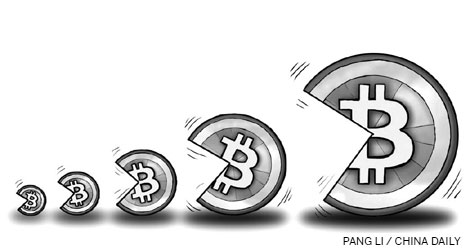Beware of the baneful Bitcoin bug
Some people have been bitten by the Bitcoin bug, bidding up its value to above $1,000 for just one invisible "coin". Others have been bitten by scams, losing real money they paid only to be "hacked".
The digital currency seems mysterious to a newcomer and yet most impressive when a serious business dinner ends with payment to the waiter with a casual brush of a smart phone. The former tradition of a comical pretense of who pays the bill, with grabbing of wrists and fumbling for cash or card, has given way to an aura of awe as a new avant-garde era makes being generous look cool.
China now transacts half of the global Bitcoin volume and is a leader in pushing up the exchange rate. A schoolteacher cum computer geek named Li Xiao who signed up at the outset five years ago now has Bitcoins worth millions of US dollars. It's time for those not in the know to understand this new phenomenon.
Barter trading began with cavemen. "Money" allows flexibility, tokens, metals and paper. The global financial crisis of 2008 is said to have been "resolved" not with the physical printing of more currency notes, as depicted in news stories, but simply through computer clicks, now ratcheting up $85 billion a month out of the US Federal Reserve.
It is no coincidence that small groups of computer geeks found 2008 the right time to introduce a virtual currency. Bitcoins are not backed by any asset and exist only in the networks of computers. They are dependent on "believers" prepared to pay conventional currency so that they can transact across borders and without any government regulation.
Like the rise of the stock market in Europe centuries ago, the first traders knew and respected each other. The camaraderie was not, as in Britain, from an "Old Boy" network of elite schools, but through exchange and development of cipher-technology, evolving into software language that was meant to guarantee security.
Ironically, but perhaps not surprisingly, though, individuals were proud of their independence and freedom. "Cyphering" was standardized through involvement and imprimatur of the US National Security Agency. The concept of secure exchange had been around for 20 years but the global financial crisis and the exposure of the weakness and further weakening of the dollar encouraged the launch of Bitcoin among cypher experts. Like the British Old Boys of the past, "shares" were traded only among those known, trusted and respected. Despite being strung around the world and possibly never meeting, their interaction on their core interests verified commitment.
Bitcoin is no joke. Baidu now supports the market. There are ATM dispensers of real cash in exchange for Bitcoins transferred from your cyber "wallet". What drives the seriousness of the mechanism is that an increased number of "believers" can "mint" new Bitcoins. Those with the will and ability to maintain the mechanism are said to "mine" new wealth and this is clearly addictive to certain kinds of people. It is an interest that pays.
Over the past week or so, a person could earn about 0.0001 Bitcoins (maybe 1 yuan at the current exchange rate) in one hour of expert "mining". But given that addicts spend their waking hours at this and that speculation is driving value up, it beats unemployment.
The individual launching Bitcoin is unknown, except through the thorough planning of the venture and a pseudonym, "Satoshi Nakamoto". The prime guess is that the individual is an expert cyber geek in Finland or an American infatuated with Japanese culture. The individual made a fortune cashing in Bitcoins for dollars in 2010 and left a cryptic note about "moving on".
That single fact spells out in large fonts that Bitcoin is a Ponzi scheme in which the first wave of players makes money and leaves the base of the pyramid to collapse. Clinton Dines, one of China's expatriate community's respected business leaders who has been in China for 34 years, merely mutters the previous testimonies to human greed and folly: the Dutch "tulip mania" of four centuries ago when a single tulip bulb from Turkey promised wealth such that it was equal to years of income, and the English "South Sea Bubble" of three centuries ago, pretending England would colonize South America.
John Gruetzner, principal and founder of Intercedent Limited, believes that Bitcoin is potentially a device, which, if not regulated, will ultimately become a tool for the Tea Party to circumvent government and create a currency for the 1 percent class, and that it will collapse eventually.
The father of economics, Adam Smith, in his Wealth of Nations explained the value of money representing hunters, acknowledging that one beaver was worth two deer. Primitive hunters would trade based on reality. Bitcoin has no physical equivalent. It depends on people pretending the emperor has clothes. Individual perception or group deception. Just take an "i" out of Bitcoin. Bitcon.
The author is an Australian researcher collaborating with Chinese academic and commercial institutions.

























